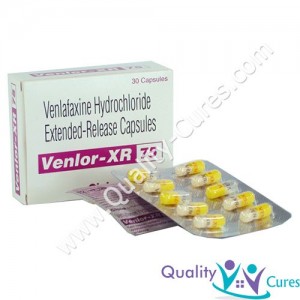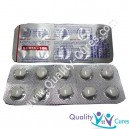Cart
0
Product
Products
(empty)
No products
To be determined
Shipping
US$ 0.00
Total
Product successfully added to your shopping cart
Quantity
Total
There are 0 items in your cart.
There is 1 item in your cart.
Total products
Total shipping
To be determined
Total
 View larger
View larger
Venlafaxine Extended Release VENLOR (Effexor) US $ 0.40 ea
Package Size: 100ct (Full Pack), 20ct Available Strengths: 37.5mg ER, 75mg ER, 150mg ER
Venlafaxine is an antidepressant used to treat depression and anxiety. It may also be used to treat other conditions as determined by your doctor.
Manufacturer: Cipla Limited
Shipped direct from supplier RPD(India). Additional terms & conditions apply.
2954 Items
Maximum Order: 3 Units
By buying this product you can collect up to 1 loyalty point. Your cart will total 1 loyalty point that can be converted into a voucher of US$ 1.25.
Data sheet
| Generic Name | Venlafaxine |
| Popular Brands | Venlor, Ventab, Elafax, Venlafaxina, Effexor |
| Package | 100ct (Full Pack), 20ct |
| Max Order Size | 3 |
| Package Description | Blister Pack |
| Strengths | 37.5mg ER, 75mg ER, 150mg ER |
More info
What is the most important information I should know about Venlafaxine?
- Do not take Venlafaxine if you have taken a monoamine oxidase inhibitor (MAOI) such as isocarboxazid (Marplan), phenelzine (Nardil), selegiline (Eldepryl, Emsam), or tranylcypromine (Parnate) during the past 14 days. Serious and sometimes fatal reactions have occurred when these medicines were taken at the same time and they must not be used together with Venlafaxine.
- You may have an increased risk of suicidal thoughts or behavior at the start of treatment with an antidepressant medication, especially if you are 18 years of age or younger. Talk with your doctor about this risk. While you are taking Venlafaxine you will need to be monitored for worsening symptoms of depression and/ or suicidal thoughts during the first weeks of treatment, or whenever your dose is changed. In addition to you watching for changes in your own symptoms, your family or other caregivers should be alert to changes in your mood or symptoms. Your doctor will need to check you at regular visits for at least the first 12 weeks of treatment.
- Contact your doctor if you have any of the following side effects, especially if they are new symptoms or if they get worse: mood changes, anxiety, panic attacks, trouble sleeping, irritability, agitation, aggressiveness, severe restlessness, mania (mental and/ or physical hyperactivity), or thoughts of suicide or hurting yourself.
- It may take 4 weeks or more for you to start feeling better. Do not stop using Venlafaxine without first talking to your doctor. You may have unpleasant side effects if you stop taking this medication suddenly.
What is Venlafaxine?
- Venlafaxine is in a class of drugs called antidepressants. Venlafaxine affects chemicals in the brain that may become unbalanced and cause depression, panic, or anxiety.
- Venlafaxine is used to treat major depressive disorder, anxiety, and panic disorder.
- Venlafaxine may also be used for purposes other than those listed in this medication guide.
What should I discuss with my healthcare provider before taking Venlafaxine?
- You may have an increased risk of suicidal thoughts or behavior at the start of treatment with an antidepressant medication, especially if you are under 18 years old. Talk with your doctor about this risk. While you are taking Venlafaxine you will need to be monitored for worsening symptoms of depression and/ or suicidal thoughts during the first weeks of treatment, or whenever your dose is changed. In addition to you watching for changes in your own symptoms, your family or other caregivers should be alert to changes in your mood or symptoms. Your doctor will need to check you at regular visits for at least the first 12 weeks of treatment.
- Do not take Venlafaxine if you have taken a monoamine oxidase inhibitor (MAOI) such as isocarboxazid (Marplan), phenelzine (Nardil), selegeline (Eldepryl, Emsam), or tranylcypromine (Parnate) during the past 14 days. Serious and sometimes fatal reactions have occurred when these medicines were taken at the same time and they must not be used together with Venlafaxine. You must wait at least 7 days after you stop taking Venlafaxine before you start taking an MAO inhibitor.
- Before taking Venlafaxine, tell your doctor if you have:
- cirrhosis or other liver disease;
- kidney disease;
- a family or personal history of bipolar disorder (manic depression);
- a family or history of suicidal thoughts or actions;
- high blood pressure;
- glaucoma;
- seizures or epilepsy;
- a bleeding or blood clotting disorder;
- diet pills; or
- high cholesterol.
- If you have any of the conditions listed above, you may not be able to take Venlafaxine, or you may need a dosage adjustment or special monitoring during treatment.
- FDA pregnancy category C. This medication may be harmful to an unborn baby. Similar medicines have caused problems in newborn babies of mothers who used the drug late in pregnancy (during the third trimester). Tell your doctor if you are pregnant or plan to become pregnant during treatment.
- Venlafaxine can pass into breast milk and may harm a nursing baby. Do not use this medication without telling your doctor if you are breast-feeding a baby.
- Older adults may be more sensitive to the side effects of this medication.
How should I take Venlafaxine?
- Take this medication exactly as it was prescribed for you. Do not take the medication in larger amounts, or take it for longer than recommended by your doctor. Your doctor may occasionally change your dose to make sure you get the best results from the medication.
- Take each dose with water. You should take Venlafaxine with food.
- Swallow the controlled-release capsule (Venlafaxine XR) whole, without crushing or chewing. To make the medication easier to swallow, you may open the capsule and sprinkle the medicine into a small amount of applesauce. Swallow all of the mixture without chewing, and do not save any for later use.
- Try to take Venlafaxine at the same time each day.
- It may take 4 weeks or more for you to start feeling better. Do not stop using Venlafaxine without first talking to your doctor. You may have unpleasant side effects if you stop taking this medication suddenly.
- Store Venlafaxine at room temperature away from moisture and heat.
What happens if I miss a dose?
- Take the missed dose as soon as you remember. However, if it is almost time for the next regularly scheduled dose, skip the missed dose and take the next one as directed. Do not take extra medicine to make up the missed dose.
What happens if I overdose?
- Seek emergency medical attention if you think you have taken too much of this medication.
- Symptoms of a Venlafaxine overdose may include dizziness, sleepiness, nausea, and numbness or tingling in your hands or feet.
What should I avoid while taking Venlafaxine?
- Avoid drinking alcohol, which can increase some of the side effects of Venlafaxine.
- Avoid using other medicines that make you sleepy (such as cold medicine, pain medication, muscle relaxers, other antidepressants, and medicine for seizures). They can add to sleepiness caused by Venlafaxine.
- Venlafaxine can cause side effects that may impair your thinking or reactions. Be careful if you drive or do anything that requires you to be awake and alert.
What are the possible side effects of Venlafaxine?
- Get emergency medical help if you have any of these signs of an allergic reaction: skin rash or hives; difficulty breathing; swelling of your face, lips, tongue, or throat.
- Contact your doctor promptly if you have any of the following side effects, especially if they are new symptoms or if they get worse: mood changes, anxiety, panic attacks, trouble sleeping, irritability, agitation, aggressiveness, severe restlessness, mania (mental and/ or physical hyperactivity), thoughts of suicide or hurting yourself.
- Call your doctor at once if you have any of these serious side effects:
- feeling light-headed, fainting;
- increased blood pressure (severe headache, blurred vision);
- seizure (convulsions); or
- fast or slow heartbeat.
- Other less serious side effects are more likely to occur, such as:
- drowsiness or dizziness;
- nervousness or anxiety;
- dry mouth;
- nausea, vomiting, diarrhea, constipation;
- decreased sex drive, impotence, or difficulty having an orgasm;
- headache, blurred vision;
- sleep problems (insomnia);
- tremor or chills;
- increased sweating; or
- changes in appetite or weight.
- Side effects other than those listed here may also occur. Talk to your doctor about any side effect that seems unusual or that is especially bothersome.
What other drugs will affect Venlafaxine?
- Do not take Venlafaxine together with a monoamine oxidase inhibitor (MAOI) such as isocarboxazid (Marplan), phenelzine (Nardil), selegiline (Eldepryl), or tranylcypromine (Parnate). You must wait at least 14 days after stopping an MAOI before you can take Venlafaxine. You must wait at least 7 days after you stop taking Venlafaxine before you start taking an MAO inhibitor.
- Before taking Venlafaxine, tell your doctor if you are using any of the following medicines:
- diet pills;
- diuretics;
- cimetidine (Tagamet, Tagamet HB);
- warfarin (Coumadin);
- amiodarone (Cordarone), quinidine (Quinadex, Cardioquin, Quinaglute), mibefradil (Posicor)
- methadone (Dolophine, Methadose);
- HIV medicines such as indinavir (Crixivan), ritonavir (Norvir); saquinavir (Invirase), nelfinavir (Viracept);
- haloperidol (Haldol) or risperidone (Risperdal); or
- other antidepressants such as clomipramine (Anafranil), desipramine (Norpramin), duloxetine (Cymbalta), fluoxetine (Prozac), paroxetine (Paxil), buproprion (Wellbutrin, Zyban).
- If you are using any of these drugs, you may not be able to use Venlafaxine, or you may need dosage adjustments or special tests during treatment.
- There may be other drugs not listed that can affect Venlafaxine. Tell your doctor about all the prescription and over-the-counter medications you use. This includes vitamins, minerals, herbal products, and drugs prescribed by other doctors. Do not start using a new medication without telling your doctor.





